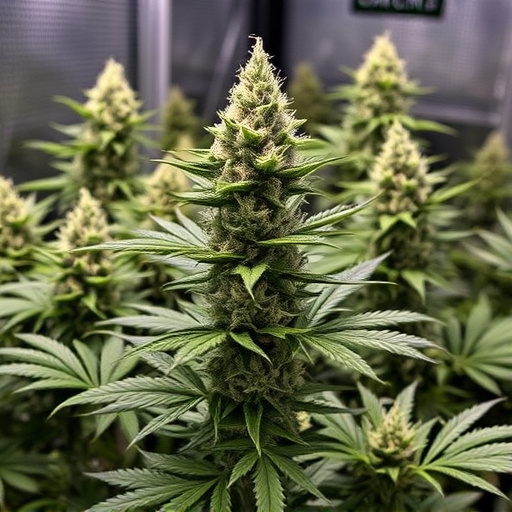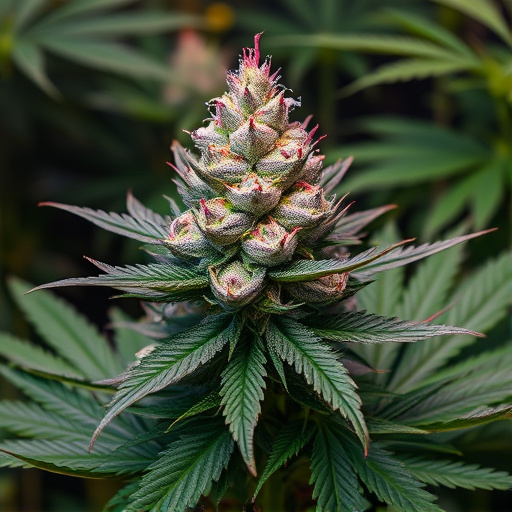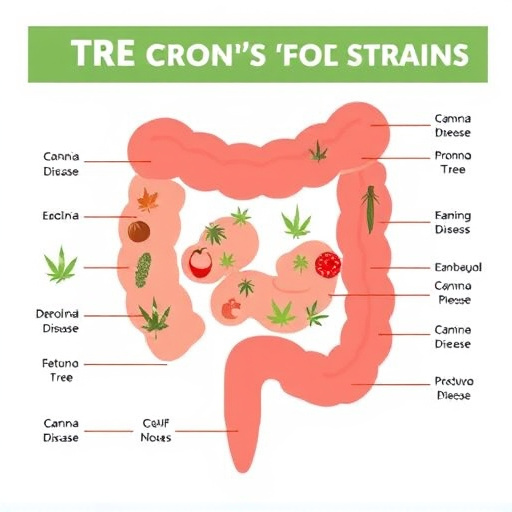Terpenes, natural compounds in cannabis, significantly influence the therapeutic effects of different strains, particularly for managing Crohn's disease. Compounds like myrcene and linalool offer anti-inflammatory properties, while terpinolene aids sleep and analgesia. Caryophyllene reduces stress. Understanding terpene profiles is crucial for tailoring cannabis treatments, as these compounds can enhance the benefits of cannabinoids like THC and CBD, providing effective symptom management for Crohn's disease patients.
Cannabis has long been celebrated for its diverse effects, but much of this is attributed to terpenes—the chemical compounds responsible for aroma, flavor, and even therapeutic benefits. This article delves into the fascinating world of terpenes, exploring their crucial role in shaping cannabis experiences. We focus on their potential impact on managing Crohn’s disease through specific cannabis strains, providing insights into how different terpene profiles can enhance or alter therapeutic effects.
- Understanding Terpenes: The Chemical Compounds Shaping Cannabis Experiences
- The Impact of Terpenes on Cannabis for Crohn's Disease Management
- Exploring Specific Terpene Profiles and Their Effects on Cannabis Therapy
Understanding Terpenes: The Chemical Compounds Shaping Cannabis Experiences

Terpenes, a diverse group of aromatic compounds, play a pivotal role in shaping the unique experiences associated with different cannabis strains. These chemical substances are naturally produced by various plants, including cannabis, and are responsible for their distinct scents and flavors. Beyond their contribution to the sensory appeal, terpenes have been found to influence the therapeutic effects of cannabis, offering potential benefits for specific conditions like Crohn’s disease.
Each terpene possesses its own set of properties, contributing to either enhancing or modifying the primary cannabinoids, such as THC and CBD. For instance, myrcene, with its earthy and fruity aroma, is known to promote relaxation and may alleviate inflammation, making it potentially beneficial for individuals with Crohn’s disease seeking relief from associated symptoms. Understanding the complex interplay between terpenes and cannabinoids is crucial in harnessing the full potential of cannabis-based treatments, tailored to individual needs.
The Impact of Terpenes on Cannabis for Crohn's Disease Management

Terpenes, the aromatic compounds found in many plants, play a significant role in shaping the effects of cannabis. When it comes to managing Crohn’s disease, certain terpenes in specific cannabis strains have shown potential benefits. Some terpenes like linalool and myrcene are known for their anti-inflammatory properties, which can help reduce inflammation associated with the condition. These compounds may also contribute to improved sleep quality, a common challenge for individuals living with Crohn’s.
Cannabis strains rich in terpinolene have gained attention for their potential analgesic and anti-nausea effects, offering relief from pain and discomfort often experienced during flare-ups. Additionally, the soothing and calming effects of terpenes like caryophyllene may help manage stress and anxiety, common comorbidities linked to Crohn’s disease. With ongoing research highlighting the complex interplay between terpenes and cannabis compounds like THC and CBD, understanding the specific profiles of different strains can empower individuals in their journey towards managing Crohn’s disease effectively.
Exploring Specific Terpene Profiles and Their Effects on Cannabis Therapy

Exploring Specific Terpene Profiles and Their Effects on Cannabis Therapy
Cannabis strains vary greatly in their terpene profiles, offering a diverse range of potential therapeutic benefits. Terpenes are aromatic compounds that not only give cannabis its unique scent but also play a significant role in modulating the plant’s effects on the body. Each terpene possesses distinct properties that can enhance or alter the experience of cannabis consumption. For instance, myrcene is known for its relaxing and sedative qualities, making it potentially beneficial for managing sleep disorders and reducing anxiety. Similarly, limonene has uplifting and energizing effects, which may aid in relieving stress and depression.
When considering cannabis for conditions like Crohn’s disease, exploring specific terpene profiles becomes crucial. Certain strains high in myrcene have shown promise in alleviating inflammation and gastrointestinal discomfort associated with Crohn’s. Terpenes can also interact synergistically with cannabinoids like THC and CBD, enhancing or modifying their effects. For example, a strain rich in both myrcene and CBD may offer potent anti-inflammatory and analgesic properties, making it a potential treatment option for Crohn’s disease symptoms.
Terpenes, alongside cannabinoids, play a pivotal role in shaping the unique effects of different cannabis strains. Understanding these chemical compounds is crucial for those utilizing cannabis for medical purposes, such as managing Crohn’s Disease. Specific terpene profiles offer tailored therapeutic benefits, enabling patients to choose strains that align with their desired outcomes. Further research into terpene-cannabinoid interactions can lead to personalized medicine approaches, enhancing the effectiveness of cannabis therapy for various conditions, including Crohn’s Disease.














